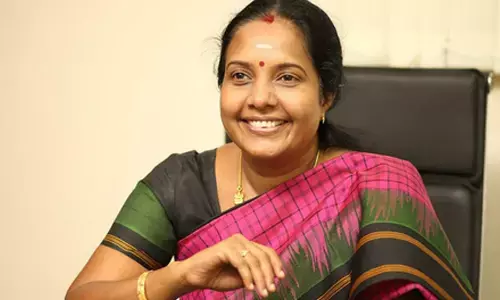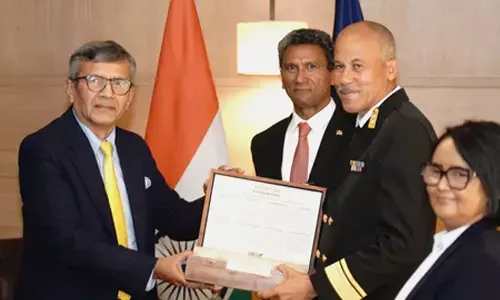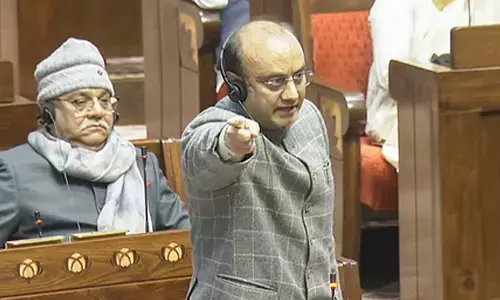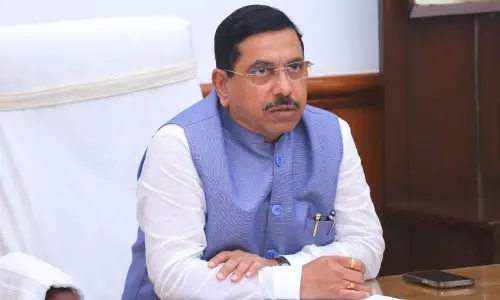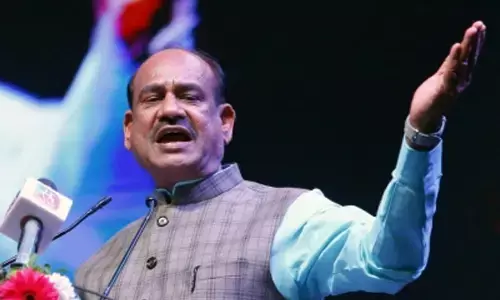The importance of being Dr BR Ambedkar
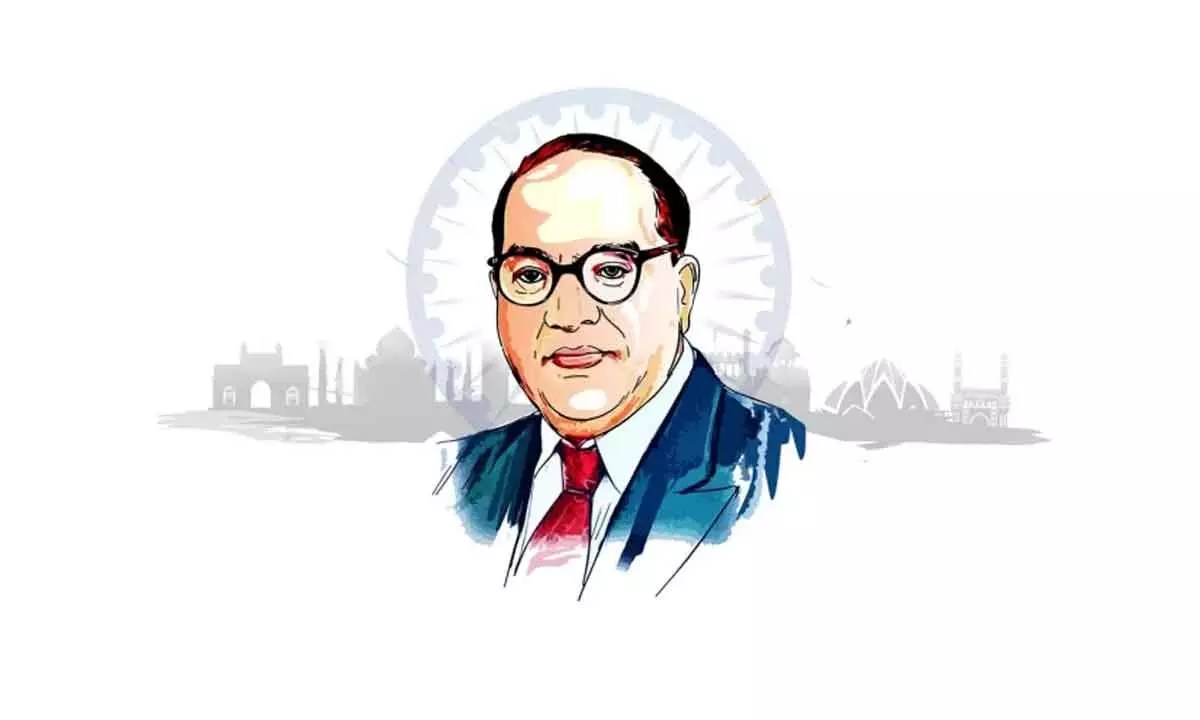
Our true homage to Dr BR Ambedkar on his jayanti would be to resolve to end poverty and ensure justice and equality to all in sharing national opportunities and facilities. We have rejected untouchability but still a lot needs to be done to end social disparities in totality. Those who are deprived have to be holistically empowered. By rising above the petty considerations of caste, creed, region and religion, we have to make India Vishwa Guru. Let noble thoughts come from all sides, and let us spread them across the globe in Amrit Kaal
For centuries, we as a nation struggled to cope with untouchability and caste-based discrimination. Such inhuman practices demeaned a vast section of Hindus, who were categorised as untouchables. From time to time, great souls tried to salvage us from the repercussions of various social evils. Some of them were Sant Shiromani Ravidas, Sant Chokhamela, Sant Kabir Das, Swami Dayanand Saraswati, Swami Ram Krishna Paramhans and Sant Tukaram to name a few.
At the fag-end of the 19th century, a boy full of promises was enjoying his classroom teaching in the school. One day, he was made to sit at the back of the classroom when it was found that he was untouchable. Once he was travelling to his maternal uncle's village along with his brother and cousin. The cart man dropped them midway when he came to know that they were untouchables. Another day, the boy was going somewhere. In between, he stopped to drink water from a public tap. He was beaten as untouchables were not allowed to use the facility.
The boy was none other than Dr Bhimrao Ramji Ambedkar, popularly known as Babasaheb Ambedkar, born to Ramji Maloji Sakpal and Bhimabai Murbadkar Sakpal on April 14, 1891 in Mhow Army Cantonment. He was the 14th child of his parents. His tryst with social evils as worse as untouchability, caste-based persecution and discrimination during his childhood left an indelible mark on his life and thought process. His own experience from the incidents in his life made him realise how deeply casteism, untouchability, insults and humiliation were rooted in Hindu society. Even the cruelty of fate did not spare him. He lost his mother when he was just six years old. Notwithstanding the trauma of discrimination and discrimination, he did not give up and continued his struggle and studies against all odds. It was an incredible example of exemplary grit, determination and never-say-die spirit.
Dr Ambedkar did his matriculation in 1908 from Elphinstone High School. His father gave him good sanskar and used to share stories and thoughts of great saints like Tukaram, Gyaneshwar, teachings of the Ramayana and the Mahabharata. He studied Economics and Political Science from Elphinstone College. In 1912, he got the degree from Bombay University. With the scholarship from Maharaja of Baroda, he went to Columbia University, New York City from where he got Master's degree in June 1915 after successfully completing his thesis on 'Ancient Indian Commerce.'
In 1916, he went to London School of Economics and worked on his doctoral thesis – 'The problem of the Rupee: Its origin and its solution.' He took Rs 5,000 as loan from Chhatrapati Shahu ji Maharaj for his further studies. In 1920, he received the D Sc by London University! He also went to the University of Bonn, Germany. In June 1927, he was awarded a Doctorate by the University of Columbia. He was a rare Indian politician of his time who studied at Columbia University, LSE and University of Bonn.
Dr Ambedkar was worried about the fate of poor people, untouchables. He wanted them to be independent. He established the Depressed Classes Society under the presidency of Baroda Maharaj. In 1920, he started The Mooknayak, a Marathi publication which enabled him to criticise the rigid Hindu beliefs and Bahishkrit Bharat, also Marathi magazine in 1927, to highlight the issues and aspirations of depressed sections of society. He was so passionate about eradicating the practice of caste discrimination in India that led him to establish Bahishkrit Hitakarni Sabha. In 1936, he founded the Independent Labour Party. It contested the 1937 Bombay election to the Central Legislative Assembly for 13 reserved and four general seats and won 11 reserved and three seats respectively. For him, democratic values were of paramount importance!
After completing his studies defying all hardships, Dr Ambedkar dedicated his life to the cause of the downtrodden, their emancipation and empowerment. Hence, struggle became an integral part of his life. In 1927, Dr Ambedkar led a peaceful agitation by drinking water from Chowdar tank in Mahad, in Raigad district in Maharashtra ,along with thousands of his followers when untouchables were not allowed to access water from the tank despite a 192 resolution moved by CK Bole and adopted by the Bombay government, allowing all untouchables to use public watering places, wells and dharamshalas, which were maintained through public funds.
Dr Ambedkar led a movement on March 3, 1930 to secure the entry of all Hindus to Kalaram temple in Nasik. He was in favour of a complete overhauling of Hindu society and Hindu theology and to secure equal rights for all Hindus. He was a votary of inclusivity. Casteism and untouchability go against the spirit of Hinduism, Vedas. Its essence lies in quality, justice, fraternity and brotherhood. He was surprised that Hinduism which is so accommodative and yet treats a vast chunk of people as untouchables, even worse than animals. This was his pain.
He was not inimical to Hindutva. He had resentment against Hinduism but he was not opposed to Hinduism. His acceptance of Buddhism on October 14, 1956 is a case in point as Buddhism is very much rooted in Bharatiya culture. He did not embrace any other religion though Islamic and Christian scholars tried their best to influence him. It is said that when Dr Ambedkar met Mahatma Gandhi during the second Round Table Conference, he told him that he could not accept a religion which treats humans as cats and dogs, and he will embrace a religion which is less harmful to Hinduism.
The versatility of Dr Ambedkar's personality was matchless. His ability to listen to his critics was simply brilliant. Notwithstanding his differences with Veer Savarkar and Mahatma Gandhi on a number of issues, they were unanimous in their views of achieving the goal of social equality and freeing society from abominable evils such as untouchable. Dr Ambedkar did never support armed struggle but always favoured unity among oppressed social groups to get their socio-political and economic rights. He wanted downtrodden and oppressed sections of society to stay united and acquire knowledge and education so that they are not oppressed.
As the architect of our Constitution, Dr Ambedkar has given us the mantra and roadmap to build a stronger, healthier and more inclusive society. His commitment to the cause of social equality and social justice is a guiding force for all those who are part of public life. He was not only the leader for oppressed and depressed. He was the leader of 135 crore people of our country – India. He was a true nationalist leader, a true patriot. He achieved an eternal place in people's hearts. His contributions cannot be estimated but can only be felt and lived by all.
Our true homage to Dr BR Ambedkar on his jayanti would be to resolve to end poverty and ensure justice and equality to all in sharing national opportunities and facilities. We have rejected untouchability but still a lot needs to be done to end social disparities in totality. Those who are deprived have to be holistically empowered. By rising above the petty considerations of caste, creed, region and religion, we have to make India Vishwa Guru. Let noble thoughts come from all sides, and let us spread them across the globe in Amrit Kaal!
(The writer is Governor, Haryana. The views expressed are strictly his personal.)



